外研(新标准)版七年级下Revision module B 复习课件+嵌入音视频(共44张PPT)
文档属性
| 名称 | 外研(新标准)版七年级下Revision module B 复习课件+嵌入音视频(共44张PPT) |
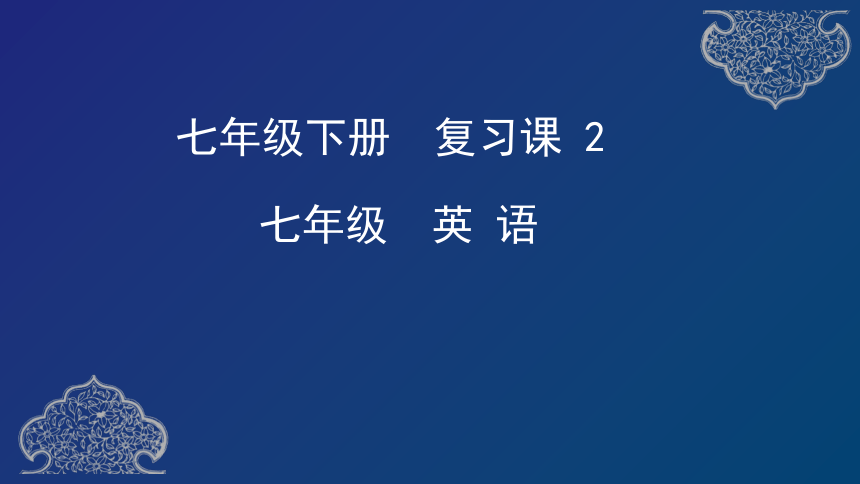
|
|
| 格式 | pptx | ||
| 文件大小 | 17.5MB | ||
| 资源类型 | 教案 | ||
| 版本资源 | 外研版 | ||
| 科目 | 英语 | ||
| 更新时间 | 2022-05-26 14:01:22 | ||
图片预览


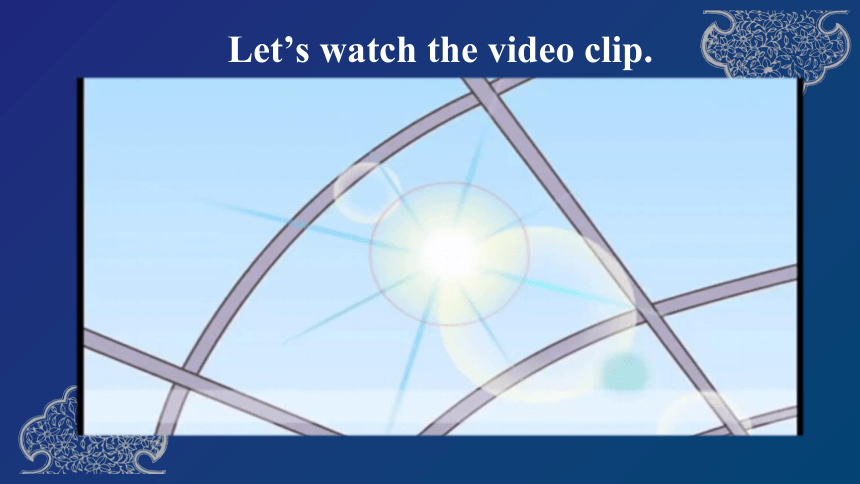
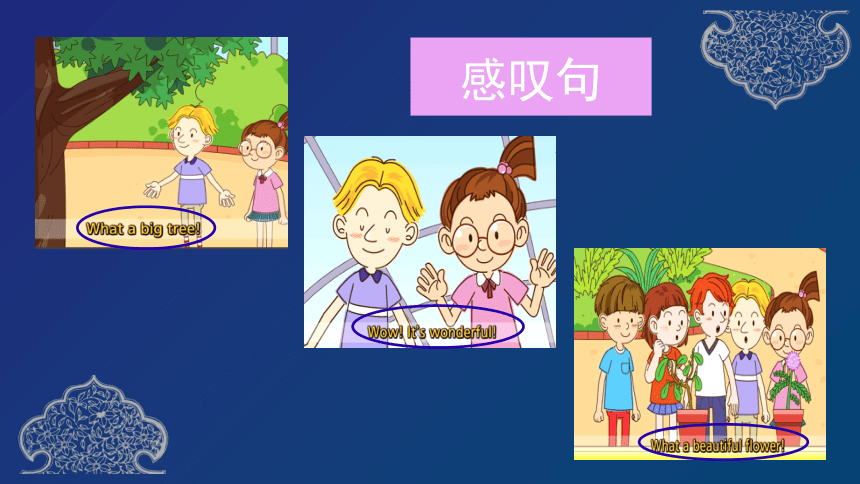
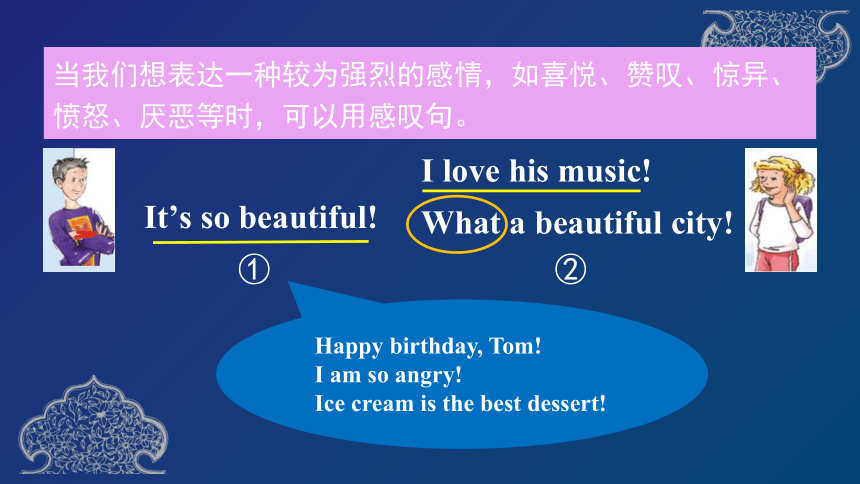
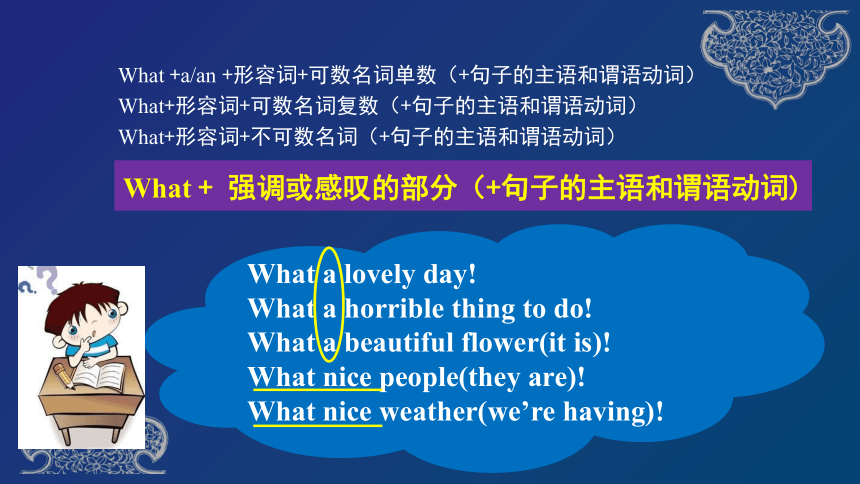
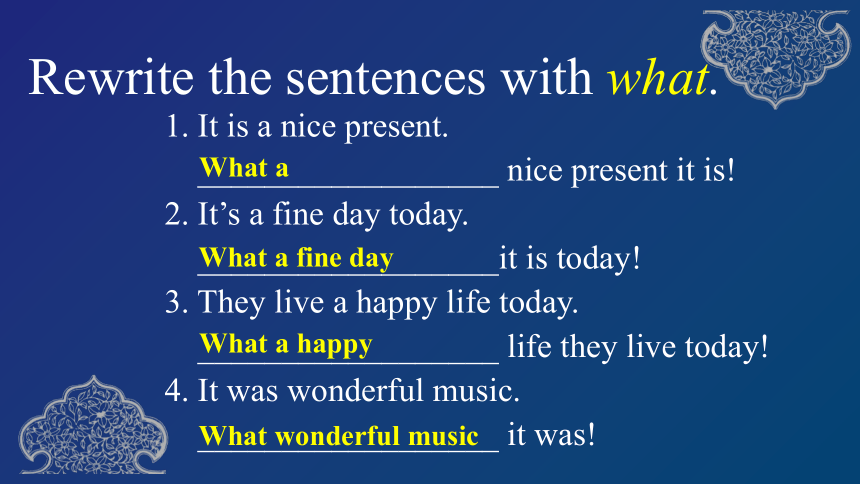
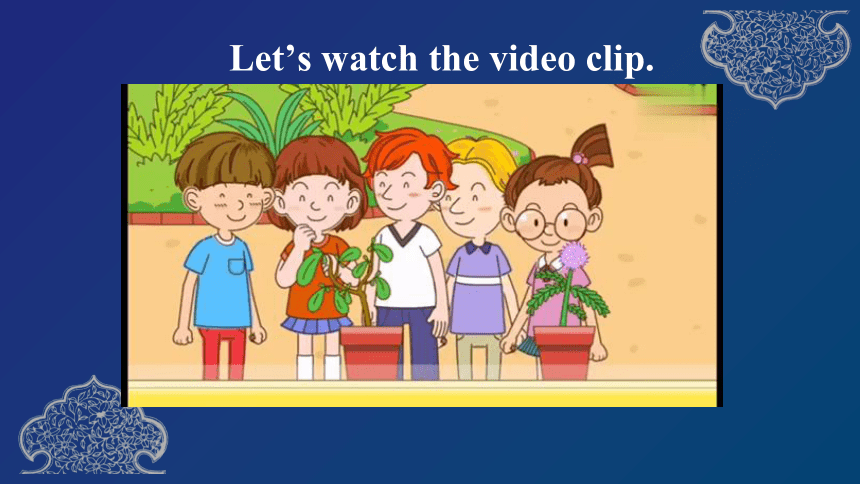
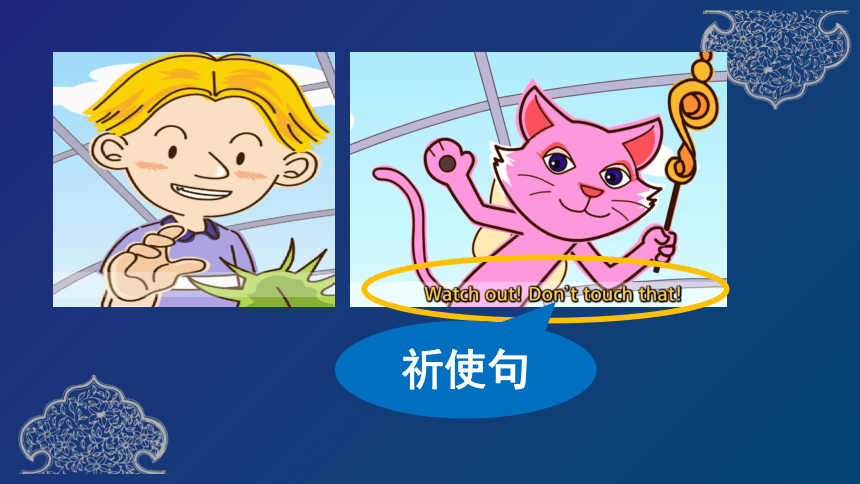
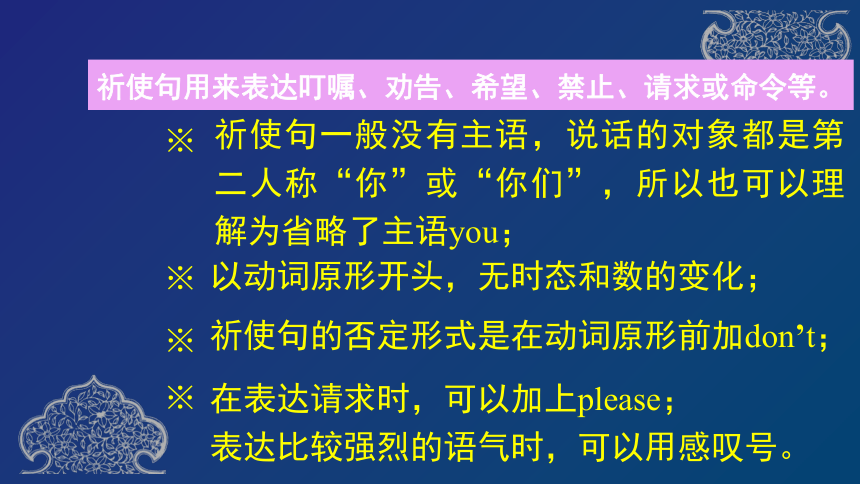
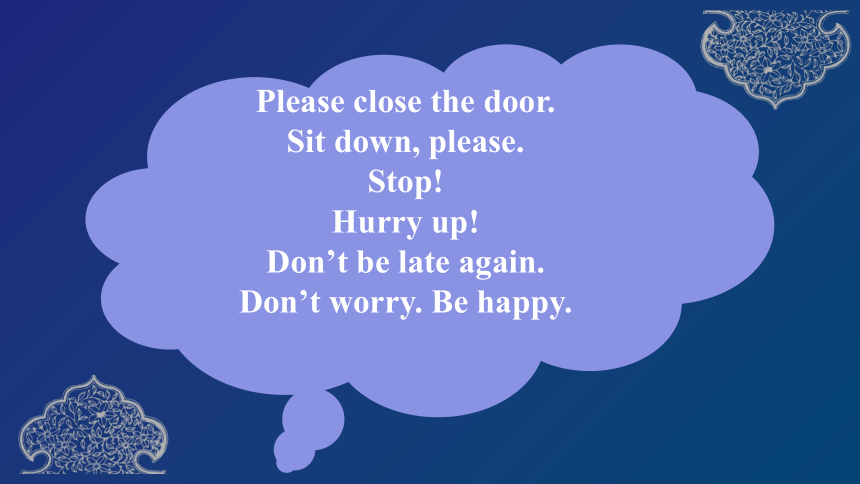
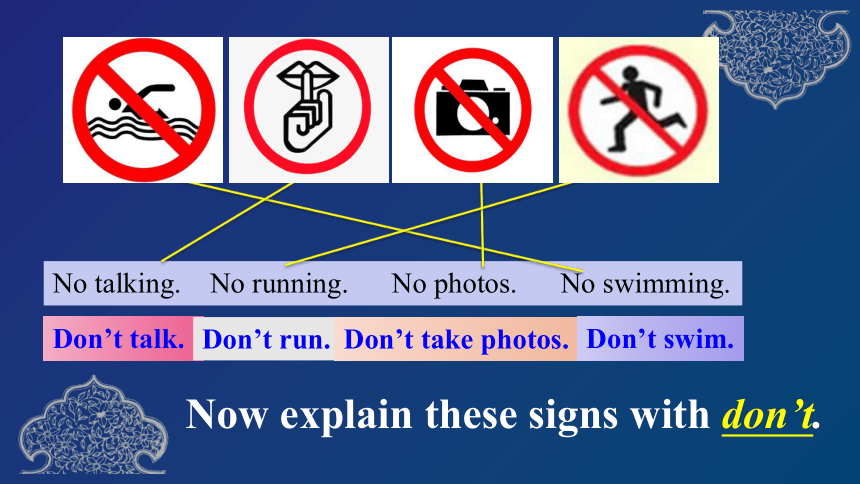
文档简介
(共44张PPT)
七年级下册 复习课 2
七年级 英 语
内容分析
本节课以七年级下册Revision module B 为素材,目的是对后六个模块中的语言知识进行归纳总结、检查评估,对听、说、读、写技能进行进一步的综合训练,以完成检测评估的目标。
Let’s watch the video clip.
感叹句
当我们想表达一种较为强烈的感情,如喜悦、赞叹、惊异、
愤怒、厌恶等时,可以用感叹句。
It’s so beautiful!
What a beautiful city!
①
②
Happy birthday, Tom!
I am so angry!
Ice cream is the best dessert!
I love his music!
What a lovely day!
What a horrible thing to do!
What a beautiful flower(it is)!
What nice people(they are)!
What nice weather(we’re having)!
What + 强调或感叹的部分(+句子的主语和谓语动词)
What +a/an +形容词+可数名词单数(+句子的主语和谓语动词)
What+形容词+可数名词复数(+句子的主语和谓语动词)
What+形容词+不可数名词(+句子的主语和谓语动词)
Rewrite the sentences with what.
1. It is a nice present.
__________________ nice present it is!
2. It’s a fine day today.
__________________it is today!
3. They live a happy life today.
__________________ life they live today!
4. It was wonderful music.
__________________ it was!
What a
What a fine day
What a happy
What wonderful music
Let’s watch the video clip.
祈使句
祈使句用来表达叮嘱、劝告、希望、禁止、请求或命令等。
※
祈使句一般没有主语,说话的对象都是第二人称“你”或“你们”,所以也可以理解为省略了主语you;
※
以动词原形开头,无时态和数的变化;
※
祈使句的否定形式是在动词原形前加don’t;
在表达请求时,可以加上please;
表达比较强烈的语气时,可以用感叹号。
※
Please close the door.
Sit down, please.
Stop!
Hurry up!
Don’t be late again.
Don’t worry. Be happy.
No talking. No running. No photos. No swimming.
Now explain these signs with don’t.
Don’t talk.
Don’t run.
Don’t take photos.
Don’t swim.
Listening
1. Tony went to London / Hong Kong.
2. It took four / five hours to get there.
3. Tony’s uncle / aunt met them at the airport.
4. Tony saw a big ship / a dragon boat.
5. Tony bought a present / some postcards for Lingling.
Listening
1. Tony went to London / Hong Kong.
2. It took four / five hours to get there.
3. Tony’s uncle / aunt met them at the airport.
4. Tony saw a big ship / a dragon boat.
5. Tony bought a present / some postcards for Lingling.
一般过去时
一般过去时可以用来表述过去某个时间发生的事情或行为,
还可以用来描述事物过去的状态或过去经常发生的事情,
句中的谓语要用动词的过去式形式。
一般过去时
常用时间状语:yesterday, 2 years ago, just now,
last week / year / night, in the past, once upon a time...
动词过去式
规则变化
不规则变化
一般动词结尾加-ed
以“不发音的字母e结尾”的动词后加-d
以“辅音字母 + y结尾”的动词,y变为i,再加-ed
以“元音字母 + 一个辅音字母结
尾”的重读闭音节动词,先双写辅
音字母,再加-ed
be - was/were meet- met
buy- bought read- read
come- came see- saw
do- did send- sent
get- got spend- spent
go- went swim- swam
have- had take- took
write- wrote
试一试
write
be born
become
come
die
find
go
like
move
read
travel
try
was/were born
became
travelled
wrote
came
moved
read
went
found
liked
tried
died
一般过去时的几种句式
肯定句
否定句
一般疑问句及回答
特殊疑问句
肯定句:
I was born in a small village in Shanxi Province.
They were in the country in 1990.
He moved to London at twenty-eight.
You took a walk this morning.
主语+动词过去式+其他成分
行为动词
be动词
练一练
be born become come die find go like
move read travel try write
Hans Christian Andersen was a famous writer of stories for children. He (1) into a poor family in Denmark in 1805. His father
(2) when the boy was eleven. Hans(3) a few jobs. Finally, at the age of fourteen, he (4) to the capital of Denmark to work in the theatre. Then he (5) on to study and later he
(6) around Europe.
was born
died
tried
moved
went
travelled
His first book(7) out in 1822. He (8) many stories for children, but older people also(9) them interesting. Many of his stories (10) very famous, like The Ugly Duckling and The Little Match Girl. People still (11) to read them today and they can (12) them in many languages.
练一练
be born become come die find go like
move read travel try write
came
wrote
found
became
like
read
一般过去时的几种句式
否定句
一般疑问句及回答
特殊疑问句
否定句:(be动词)
I was born in Beijing.
I was not born in Beijing.
I wasn’t born in Beijing.
You were busy last week.
You were not busy last week.
You weren’t busy last week.
否定句:(行为动词)
She didn’t like the food in the big bowl.
They didn’t notice Goldilocks at first.
Baby Bear didn’t look in the bedroom.
一般过去时的否定助动词didn’t没有人称和数的变化。
I walked to school today.
I didn’t walk to school today.
练一练
Seventy years ago, when my grandpa was young, life was very different. Grandpa(1)
(listen) to music but he(2) (not watch)TV. He(3) (play)the piano but he(4) (not play)computer games. He (5) (have) a telephone, but of course he(6) (not send) emails. His family(7) (not have)a car. He(8) (ride)his bike to school and he (9) (travel) by train when he went on holiday. He often (10) (go)to the sea and (11) (swim)in the sea. He (12) (have) a camera, but it (13) (not be) a modern camera and he (14) (not take) colour photos.
listened
didn’t watch
played
didn’t play
had
didn’t send
didn’t have
rode
travelled
went
swam
had
wasn’t
didn’t take
一般过去时的几种句式
一般疑问句及回答
特殊疑问句
一般疑问句:(be动词)
Were you busy last week
Yes, I was.
No, I wasn’t.
Was it a small village
Yes, it was.
No, it wasn’t.
be动词过去式+主语+其他成分
肯定回答:Yes, 主语+相应be动词过去式.
否定回答:No, 主语+相应be动词过去式+not(或缩写形式).
一般疑问句:(行为动词)
Did you come here yesterday
Yes, I did.
No, I didn’t.
Did she go to work by bus
Yes, she did.
No, she didn’t.
Did+主语+动词原形+其他成分
肯定回答:Yes, 主语+did.
否定回答:No, 主语+did+not(或缩写形式).
Ask and answer the questions.
1. Did you go to school from Monday to Friday
2. Did anything interesting happen in school
3. Were you excited in your favourite class
4. Did you do sports at school
5. Were you busy last weekend
1. I went to school from Monday to Friday.
2. Something really interesting happened in school.
3. I was excited in my favourite class.
4. I did some sports at school.
5. I was very busy last weekend.
Write down your answers.
Writing
Put your sentences together.
Use words like on Monday, and, so, but, because, first, next and finally.
I went to school from Monday to Friday last week. On Tuesday afternoon, we had a basketball match with Class 2. After school, I bought my mother a present because it was her birthday. On Wednesday, we played tennis but it rained so we went inside. On Thursday, first we had an art lesson and next we had a music lesson. On Friday, we watched a film about Chinese history. Finally, it was the weekend. I went shopping with my friends on Saturday, and on Sunday I had lunch with my grandmother.
一般过去时的几种句式
特殊疑问句
特殊疑问句:
— When did he die
— He died in 1919.
— Why did they want him
— Because they needed him to help them.
— How long did the space flight last
— It lasted twenty-one hours.
一般过去时的特殊疑问句与一般现在时的特殊疑问句在结构上没有太大差别,只是使用的助动词不同而已。
Ask and answer the questions.
A: where / go / on holiday
B: to the sea
A: what / you / do
B: swim in sea, eat in restaurant
A: you / buy / presents
B: yes, / spend / lot of money
A: Where did you go on holiday
B: We went to the sea.
A: What did you do
B: We swam in the sea and ate in a restaurant.
A: Did you buy any presents
B: Yes, we spent a lot of money.
Ask and answer the questions.
Read and answer the questions.
1. When did Emma arrive in London
2. Who did Emma go to London with
3. How did Emma and Jenny get to their hotel
4. Where did they have dinner yesterday
5. What did Emma send to Henry, a present or a postcard
Henry,
Hi! I’m on holiday in London with my friend Jenny. We arrived by plane on Monday and took a taxi to our hotel in central London. I went for a walk in Hyde Park but Jenny was tired so she didn’t come.
Yesterday morning we first visited Big Ben and Buckingham Palace. Queen Elizabeth lives in the Palace, but we didn’t see her! Then we visited the British Museum and had dinner in a Chinese restaurant!
Today we went to Tower Bridge on the River Thames and looked at the city. It’s very big! This afternoon we did some shopping. Jenny didn’t buy anything, but I bought a present for you and I posted it just now. I hope you’ll like it!
Say hello to your mum and dad.
Emma
Henry,
Hi! I’m on holiday in London with my friend Jenny. We arrived by plane on Monday and took a taxi to our hotel in central London. I went for a walk in Hyde Park but Jenny was tired so she didn’t come.
Yesterday morning we first visited Big Ben and Buckingham Palace. Queen Elizabeth lives in the Palace, but we didn’t see her! Then we visited the British Museum and had dinner in a Chinese restaurant!
Today we went to Tower Bridge on the River Thames and looked at the city. It’s very big! This afternoon we did some shopping. Jenny didn’t buy anything, but I bought a present for you and I posted it just now. I hope you’ll like it!
Say hello to your mum and dad.
Emma
①
②
③
④
⑤
1. When did Emma arrive in London
2. Who did Emma go to London with
3. How did Emma and Jenny get to their hotel
4. Where did they have dinner yesterday
5. What did Emma send to Henry, a present or a postcard
She arrived in London on Monday.
She went to London with her friend Jenny.
They took a taxi to their hotel in central London.
Yesterday they had dinner in a Chinese restaurant.
She sent a present to Henry.
Henry,
Hi! I’m on holiday in London with my friend Jenny. We arrived by plane on Monday and took a taxi to our hotel in central London. I went for a walk in Hyde Park but Jenny was tired so she didn’t come.
Yesterday morning we first visited Big Ben and Buckingham Palace. Queen Elizabeth lives in the Palace, but we didn’t see her! Then we visited the British Museum and had dinner in a Chinese restaurant!
Today we went to Tower Bridge on the River Thames and looked at the city. It’s very big! This afternoon we did some shopping. Jenny didn’t buy anything, but I bought a present for you and I posted it just now. I hope you’ll like it!
Say hello to your mum and dad.
Emma
beginning
When
Who
Where
What
How
body
ending
Write a short passage.
My last trip
Begin your passage like this:
Last year, I travelled to …
On the first day, I…
On the second day, I…
On the third day, I…
Homework
Finish your writing.
Thank you for watching!
七年级下册 复习课 2
七年级 英 语
内容分析
本节课以七年级下册Revision module B 为素材,目的是对后六个模块中的语言知识进行归纳总结、检查评估,对听、说、读、写技能进行进一步的综合训练,以完成检测评估的目标。
Let’s watch the video clip.
感叹句
当我们想表达一种较为强烈的感情,如喜悦、赞叹、惊异、
愤怒、厌恶等时,可以用感叹句。
It’s so beautiful!
What a beautiful city!
①
②
Happy birthday, Tom!
I am so angry!
Ice cream is the best dessert!
I love his music!
What a lovely day!
What a horrible thing to do!
What a beautiful flower(it is)!
What nice people(they are)!
What nice weather(we’re having)!
What + 强调或感叹的部分(+句子的主语和谓语动词)
What +a/an +形容词+可数名词单数(+句子的主语和谓语动词)
What+形容词+可数名词复数(+句子的主语和谓语动词)
What+形容词+不可数名词(+句子的主语和谓语动词)
Rewrite the sentences with what.
1. It is a nice present.
__________________ nice present it is!
2. It’s a fine day today.
__________________it is today!
3. They live a happy life today.
__________________ life they live today!
4. It was wonderful music.
__________________ it was!
What a
What a fine day
What a happy
What wonderful music
Let’s watch the video clip.
祈使句
祈使句用来表达叮嘱、劝告、希望、禁止、请求或命令等。
※
祈使句一般没有主语,说话的对象都是第二人称“你”或“你们”,所以也可以理解为省略了主语you;
※
以动词原形开头,无时态和数的变化;
※
祈使句的否定形式是在动词原形前加don’t;
在表达请求时,可以加上please;
表达比较强烈的语气时,可以用感叹号。
※
Please close the door.
Sit down, please.
Stop!
Hurry up!
Don’t be late again.
Don’t worry. Be happy.
No talking. No running. No photos. No swimming.
Now explain these signs with don’t.
Don’t talk.
Don’t run.
Don’t take photos.
Don’t swim.
Listening
1. Tony went to London / Hong Kong.
2. It took four / five hours to get there.
3. Tony’s uncle / aunt met them at the airport.
4. Tony saw a big ship / a dragon boat.
5. Tony bought a present / some postcards for Lingling.
Listening
1. Tony went to London / Hong Kong.
2. It took four / five hours to get there.
3. Tony’s uncle / aunt met them at the airport.
4. Tony saw a big ship / a dragon boat.
5. Tony bought a present / some postcards for Lingling.
一般过去时
一般过去时可以用来表述过去某个时间发生的事情或行为,
还可以用来描述事物过去的状态或过去经常发生的事情,
句中的谓语要用动词的过去式形式。
一般过去时
常用时间状语:yesterday, 2 years ago, just now,
last week / year / night, in the past, once upon a time...
动词过去式
规则变化
不规则变化
一般动词结尾加-ed
以“不发音的字母e结尾”的动词后加-d
以“辅音字母 + y结尾”的动词,y变为i,再加-ed
以“元音字母 + 一个辅音字母结
尾”的重读闭音节动词,先双写辅
音字母,再加-ed
be - was/were meet- met
buy- bought read- read
come- came see- saw
do- did send- sent
get- got spend- spent
go- went swim- swam
have- had take- took
write- wrote
试一试
write
be born
become
come
die
find
go
like
move
read
travel
try
was/were born
became
travelled
wrote
came
moved
read
went
found
liked
tried
died
一般过去时的几种句式
肯定句
否定句
一般疑问句及回答
特殊疑问句
肯定句:
I was born in a small village in Shanxi Province.
They were in the country in 1990.
He moved to London at twenty-eight.
You took a walk this morning.
主语+动词过去式+其他成分
行为动词
be动词
练一练
be born become come die find go like
move read travel try write
Hans Christian Andersen was a famous writer of stories for children. He (1) into a poor family in Denmark in 1805. His father
(2) when the boy was eleven. Hans(3) a few jobs. Finally, at the age of fourteen, he (4) to the capital of Denmark to work in the theatre. Then he (5) on to study and later he
(6) around Europe.
was born
died
tried
moved
went
travelled
His first book(7) out in 1822. He (8) many stories for children, but older people also(9) them interesting. Many of his stories (10) very famous, like The Ugly Duckling and The Little Match Girl. People still (11) to read them today and they can (12) them in many languages.
练一练
be born become come die find go like
move read travel try write
came
wrote
found
became
like
read
一般过去时的几种句式
否定句
一般疑问句及回答
特殊疑问句
否定句:(be动词)
I was born in Beijing.
I was not born in Beijing.
I wasn’t born in Beijing.
You were busy last week.
You were not busy last week.
You weren’t busy last week.
否定句:(行为动词)
She didn’t like the food in the big bowl.
They didn’t notice Goldilocks at first.
Baby Bear didn’t look in the bedroom.
一般过去时的否定助动词didn’t没有人称和数的变化。
I walked to school today.
I didn’t walk to school today.
练一练
Seventy years ago, when my grandpa was young, life was very different. Grandpa(1)
(listen) to music but he(2) (not watch)TV. He(3) (play)the piano but he(4) (not play)computer games. He (5) (have) a telephone, but of course he(6) (not send) emails. His family(7) (not have)a car. He(8) (ride)his bike to school and he (9) (travel) by train when he went on holiday. He often (10) (go)to the sea and (11) (swim)in the sea. He (12) (have) a camera, but it (13) (not be) a modern camera and he (14) (not take) colour photos.
listened
didn’t watch
played
didn’t play
had
didn’t send
didn’t have
rode
travelled
went
swam
had
wasn’t
didn’t take
一般过去时的几种句式
一般疑问句及回答
特殊疑问句
一般疑问句:(be动词)
Were you busy last week
Yes, I was.
No, I wasn’t.
Was it a small village
Yes, it was.
No, it wasn’t.
be动词过去式+主语+其他成分
肯定回答:Yes, 主语+相应be动词过去式.
否定回答:No, 主语+相应be动词过去式+not(或缩写形式).
一般疑问句:(行为动词)
Did you come here yesterday
Yes, I did.
No, I didn’t.
Did she go to work by bus
Yes, she did.
No, she didn’t.
Did+主语+动词原形+其他成分
肯定回答:Yes, 主语+did.
否定回答:No, 主语+did+not(或缩写形式).
Ask and answer the questions.
1. Did you go to school from Monday to Friday
2. Did anything interesting happen in school
3. Were you excited in your favourite class
4. Did you do sports at school
5. Were you busy last weekend
1. I went to school from Monday to Friday.
2. Something really interesting happened in school.
3. I was excited in my favourite class.
4. I did some sports at school.
5. I was very busy last weekend.
Write down your answers.
Writing
Put your sentences together.
Use words like on Monday, and, so, but, because, first, next and finally.
I went to school from Monday to Friday last week. On Tuesday afternoon, we had a basketball match with Class 2. After school, I bought my mother a present because it was her birthday. On Wednesday, we played tennis but it rained so we went inside. On Thursday, first we had an art lesson and next we had a music lesson. On Friday, we watched a film about Chinese history. Finally, it was the weekend. I went shopping with my friends on Saturday, and on Sunday I had lunch with my grandmother.
一般过去时的几种句式
特殊疑问句
特殊疑问句:
— When did he die
— He died in 1919.
— Why did they want him
— Because they needed him to help them.
— How long did the space flight last
— It lasted twenty-one hours.
一般过去时的特殊疑问句与一般现在时的特殊疑问句在结构上没有太大差别,只是使用的助动词不同而已。
Ask and answer the questions.
A: where / go / on holiday
B: to the sea
A: what / you / do
B: swim in sea, eat in restaurant
A: you / buy / presents
B: yes, / spend / lot of money
A: Where did you go on holiday
B: We went to the sea.
A: What did you do
B: We swam in the sea and ate in a restaurant.
A: Did you buy any presents
B: Yes, we spent a lot of money.
Ask and answer the questions.
Read and answer the questions.
1. When did Emma arrive in London
2. Who did Emma go to London with
3. How did Emma and Jenny get to their hotel
4. Where did they have dinner yesterday
5. What did Emma send to Henry, a present or a postcard
Henry,
Hi! I’m on holiday in London with my friend Jenny. We arrived by plane on Monday and took a taxi to our hotel in central London. I went for a walk in Hyde Park but Jenny was tired so she didn’t come.
Yesterday morning we first visited Big Ben and Buckingham Palace. Queen Elizabeth lives in the Palace, but we didn’t see her! Then we visited the British Museum and had dinner in a Chinese restaurant!
Today we went to Tower Bridge on the River Thames and looked at the city. It’s very big! This afternoon we did some shopping. Jenny didn’t buy anything, but I bought a present for you and I posted it just now. I hope you’ll like it!
Say hello to your mum and dad.
Emma
Henry,
Hi! I’m on holiday in London with my friend Jenny. We arrived by plane on Monday and took a taxi to our hotel in central London. I went for a walk in Hyde Park but Jenny was tired so she didn’t come.
Yesterday morning we first visited Big Ben and Buckingham Palace. Queen Elizabeth lives in the Palace, but we didn’t see her! Then we visited the British Museum and had dinner in a Chinese restaurant!
Today we went to Tower Bridge on the River Thames and looked at the city. It’s very big! This afternoon we did some shopping. Jenny didn’t buy anything, but I bought a present for you and I posted it just now. I hope you’ll like it!
Say hello to your mum and dad.
Emma
①
②
③
④
⑤
1. When did Emma arrive in London
2. Who did Emma go to London with
3. How did Emma and Jenny get to their hotel
4. Where did they have dinner yesterday
5. What did Emma send to Henry, a present or a postcard
She arrived in London on Monday.
She went to London with her friend Jenny.
They took a taxi to their hotel in central London.
Yesterday they had dinner in a Chinese restaurant.
She sent a present to Henry.
Henry,
Hi! I’m on holiday in London with my friend Jenny. We arrived by plane on Monday and took a taxi to our hotel in central London. I went for a walk in Hyde Park but Jenny was tired so she didn’t come.
Yesterday morning we first visited Big Ben and Buckingham Palace. Queen Elizabeth lives in the Palace, but we didn’t see her! Then we visited the British Museum and had dinner in a Chinese restaurant!
Today we went to Tower Bridge on the River Thames and looked at the city. It’s very big! This afternoon we did some shopping. Jenny didn’t buy anything, but I bought a present for you and I posted it just now. I hope you’ll like it!
Say hello to your mum and dad.
Emma
beginning
When
Who
Where
What
How
body
ending
Write a short passage.
My last trip
Begin your passage like this:
Last year, I travelled to …
On the first day, I…
On the second day, I…
On the third day, I…
Homework
Finish your writing.
Thank you for watching!
同课章节目录
- Module 1 Lost and found
- Unit 1 Whose bag is this?
- Unit 2 Are they yours?
- Unit 3 Language in use
- Module 2 What can you do ?
- Unit 1 I can play the piano
- Unit 2 I can run really fast
- Unit 3 Language in use
- Module 3 Making plans
- Unit 1 What are you going to do at the weekends?
- Unit 2 We're going to cheer the players.
- Unit 3 Language in use
- Module 4 Life in the future
- Unit 1 Everyone will study at home
- Unit 2 Every family will have a small plane.
- Unit 3 Language in use
- Module 5 Shopping
- Unit 1 What can I do for you?
- Unit 2 You can buy everything on the Internet
- Unit 3 Language in use
- Module 6 Around town
- Unit 1 Could you tell me how to get to the Nationa
- Unit 2 The London Eye is on your right.
- Unit 3 Language in use
- Revision module A
- Module 7 My past life
- Unit 1 I was born in a small village.
- Unit 2 I was born in Quincy.
- Unit 3 Language in use
- Module 8 Story time
- Unit 1 Once upon a time….
- Unit 2 Goldilocks hurried out of the house.
- Unit 3 Language in use
- Module 9 Life history
- Unit 1 He left school and began work at the age of
- Unit 2 He decided to be an actor.
- Unit 3 Language in use
- Module 10 A holiday journey
- Unit 1 What did you do?
- Unit 2 This morning we took a walk.
- Unit 3 Language in use
- Module 11 Body language
- Unit 1 They touch noses!
- Unit 2 Here are some ways to welcome them.
- Unit 3 Language in use
- Module 12 Western music
- Unit 1 It's so beautiful!
- Unit 2 Vienna is the centre of European classical
- Unit 3 Language in use
- Revision module B
